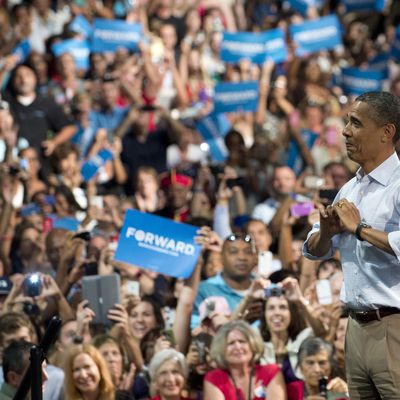
I’ve taken a fairly gloomy line on the tax deal, but to out-gloom me come James Kwak, who argues that the deal “sealed the fate of Medicare — as well as Medicaid, food stamps, and perhaps even Social Security,” and Ross Douthat, who makes a similar case. The big government-is-doomed case both make is that you can’t have spending programs without taxes. But Democrats have proven themselves unable to fight for sufficient revenue to fund the programs they want. President Obama promised to raise taxes only on households earning more than $250,000 a year, and he couldn’t hold even that very high threshold. Therefore, ultimately, Democrats will eventually have to give in on big spending cuts. (Douthat, naturally, finds the prospect more cheerful.)
The trouble I have with this case is that it didn’t really test tax hikes versus spending. What Democrats found is that, when the question is raising taxes to reduce the deficit versus not raising taxes to reduce the deficit, the political going is tougher than liberals would like. But that tells us very little about sustaining Social Security and Medicare. Those programs remain enormously popular, and Americans oppose cutting them under virtually any circumstances. At some point, we will likely face a choice of cutting benefits or raising taxes, and in the face of a simple, zero-sum choice like that, voters would overwhelmingly favor tax hikes.
The whole Republican fiscal strategy for twenty years has revolved around avoiding a zero-sum choice like this. The main element of the right’s approach has been to anathematize taxes — they won’t consider tax hikes, taxes are evil, spending is the problem, etc. One thing this does is keep Republicans out of a situation where they have to accept a general target for deficit reduction and then allocate the pain between tax hikes and popular programs. Likewise, Republicans have been trying very hard to maneuver Democrats into proposing spending cuts on their behalf.
I would like to reduce the long-term fiscal imbalance. But I also think that it works well enough to just wait around until you have to act, and when that happens, liberals will probably hold a pretty strong hand.
What liberals have to worry about, then, isn’t Medicare and Social Security. It’s discretionary spending — that is, the countless general programs the government runs. Most of these programs are themselves quite popular, or at least they would be if they were subject to high-profile debate. (Do Americans really want to cut funding for food safety inspections and highways? I don’t think so.) The trouble is that, because these programs are so individually small, it’s very hard to force a high-profile public debate. Republicans have successfully squeezed funding levels for domestic programs because it is so hard to elevate any of them to a broader national debate.
The main reason I want more tax revenue is to reduce budget pressure over the next decade and make it easier to loosen spending on those vital but politically vulnerable functions. Social Security and Medicare? They’ll be fine.






























